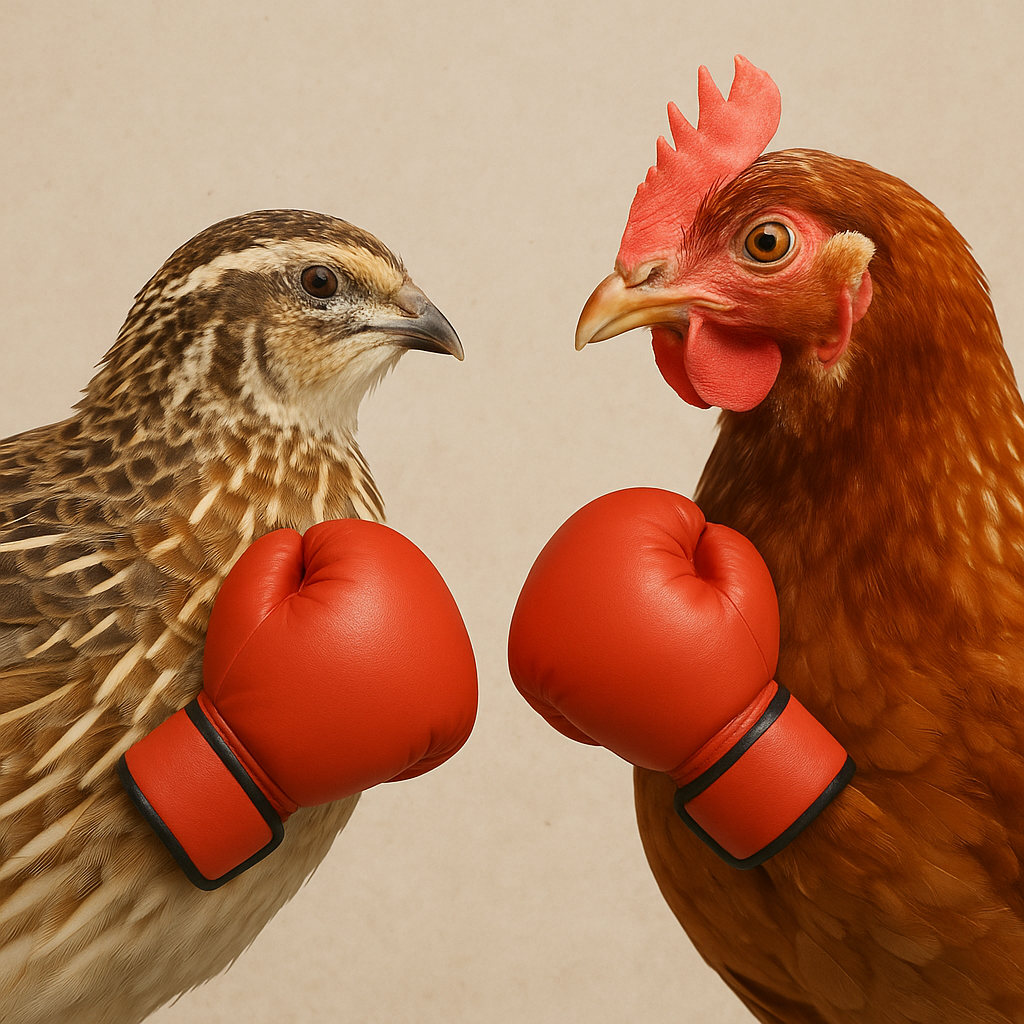If you’re deciding between raising quail or chickens, you’re not alone. Both birds offer meat, eggs, and a way to boost your homestead income—but they couldn’t be more different when it comes to space, care, and profitability. So which one’s better? Let’s break it down.
🐔 Why Even Compare Quail and Chickens?
Chickens have long been a homestead staple. But in recent years, quail have started winning hearts—and coops—across the country. Why? They’re smaller, faster to mature, and can be incredibly profitable in a tiny footprint. But they’re not a perfect fit for everyone.
🏠 Space & Housing Needs
Quail:
- Need only 1 square foot per bird.
- Can be raised indoors, in stacked cages, or in small aviaries.
- Thrive in controlled environments and predator-proof pens.
Chickens:
- Need 4 square feet per bird inside the coop and 8-10 sq ft in a run.
- Require outdoor space and strong fencing to prevent predator loss.
- Coop cleaning and maintenance are more labor-intensive.
👉 Winner: Quail for small spaces and low-maintenance housing.
🥚 Egg Production & Taste
Quail:
- Start laying at 6–8 weeks old.
- Lay ~250–300 tiny eggs per year.
- Eggs are speckled, creamy, and considered a delicacy.
Chickens:
- Start laying at 18–22 weeks old.
- Lay ~250–320 eggs per year depending on breed.
- Larger eggs, more familiar to consumers.
👉 Winner: Tie. Chickens win in egg size and familiarity. Quail win in early maturity and gourmet appeal.
🍗 Meat Yield & Butchering
Quail:
- Reach butcher weight in 6–8 weeks.
- Dressed weight ~4–6 oz.
- Mild, tender meat popular with restaurants.
Chickens:
- Reach butcher weight in 8–12 weeks (broilers).
- Dressed weight 3–6 lbs depending on breed.
- Easier to portion and freeze for family meals.
👉 Winner: Chickens for family-sized meals. Quail for quick turnaround and niche markets.
🌾 Feed Costs & Efficiency
Quail:
- Eat far less feed.
- Can thrive on game bird crumble (~24% protein).
- Convert feed to meat/eggs efficiently.
Chickens:
- Require more feed—especially laying hens and meat birds.
- Will forage, which can lower feed costs if free-ranging is safe.
👉 Winner: Quail for feed efficiency and ROI per pound.
🔊 Noise Levels & Neighbors
Quail:
- Very quiet. Males make soft crowing sounds.
- Ideal for urban or suburban setups.
Chickens:
- Hens are generally quiet. Roosters? Not so much.
- Noise complaints are a real risk in some areas.
👉 Winner: Quail if you want to keep things hush-hush.
🐣 Breeding & Hatching
Quail:
- Don’t go broody. Must use an incubator.
- Hatch in 17–18 days.
- High hatch rates with proper equipment.
Chickens:
- Some breeds will go broody and hatch their own chicks.
- Incubation takes 21 days.
- Easier for beginners wanting a natural option.
👉 Winner: Chickens for simplicity if you want nature to take the wheel. Quail for fast, incubator-based systems.
💰 Profit Potential
Quail:
- Fast turnover = fast profits.
- Specialty egg and meat markets.
- Can sell to chefs, health food stores, or directly to customers.
Chickens:
- Consistent demand for both eggs and meat.
- More competition and lower prices.
- Local ordinances might limit your flock size.
👉 Winner: Quail if you’re thinking small scale, high-margin. Chickens for broader but slower income.
Check out this blog post where I talk about my chicken eggs-periment with a new breed!
🧠 My Final Verdict
If you want fast profits, minimal space, and a quiet operation—quail are the clear winner. They’re low-cost, fast-growing, and surprisingly productive.
But if you’re looking for family-sized egg and meat production, or want to stick with tried-and-true birds, chickens are the way to go.
Honestly? Most homesteads can benefit from having both. Diversify your flock, your offerings, and your income!
Why do I think quail win? Read this here for more info


Leave a Reply